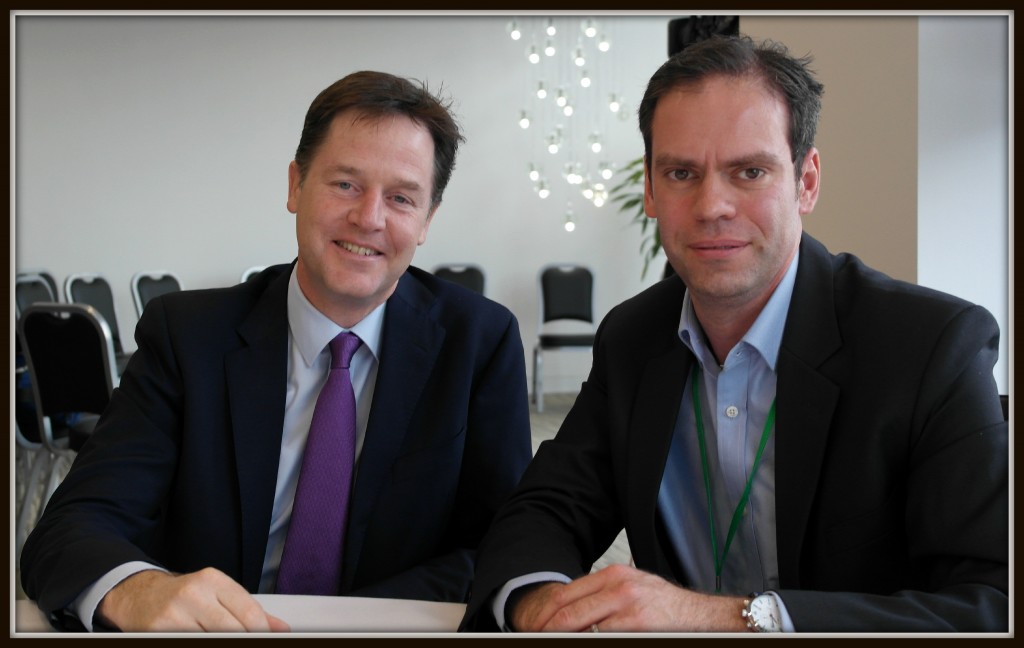
The other day I received a slightly cryptic email. Deputy Prime Minister Nick Clegg would be giving a briefing at the headquarters of professional services giant Deloitte. He would also be speaking to parents working for Deloitte and the event would be used as an opportunity to call on businesses to implement family friendly, flexible working practices. Would I be interested in hearing what Clegg had to say?
Having followed the introduction of shared parental leave very closely, I was indeed keen to hear what would be said. I was also delighted to hear a politician of Clegg’s senior rank calling on employers to think about this issue.
Once I’d got the school run out of the way, I headed straight off to Central London on Monday morning. I agreed not to write anything until today because Clegg is taking part in a further event with the Confederation of British Industry and Mumsnet that will also highlight family friendly working practices and issues surrounding paternity leave.
What took place on Monday was a very interesting discussion involving Clegg, Emma Codd, Deloitte’s Managing Partner for Talent and about 20 Deloitte staff. It was fascinating to note the diversity of the staff and their needs. In case you’re wondering why Deloitte hosted the discussion, it’s because the company has just announced enhanced paternity leave packages for its staff.
Among those in the room was a woman expecting her first child (Leisl van Zyl, see below), a mum pregnant with her second child, a dad with older children and a dad who had a child born to a surrogate. There was also a dad who happened to be a non-UK citizen and living here long-term on a work visa. As a non-Brit, he and his wife aren’t entitled to the full range of benefits a UK citizen would be, thereby placing certain pressures on his family unit.
The gathering demonstrated perfectly just how diverse families are and why there is a desperate need for employers to be as family friendly as they possibly can. It also rammed home the point that the rigid, antiquated maternity and paternity leave systems are completely inadequate. This is something the new shared parental leave system coming into force in April should go some way to remedying. The enhanced rights to request flexible working will also help families to strike a better work / life balance.
I’ve written previously about shared parental leave and the new flexible working rules (and also took part in a Google+ hangount organised by BritMums that featured Equalities Minister Jo Swinson). I won’t go into the detail about shared parental leave and flexible working or else this will turn into an exceedingly long post. If you do want to know more, however, please take a look here, here or here.
I was also lucky enough to get a few minutes with the Deputy Prime Minster himself. I only had the time to ask a few questions, but here’s what was said:
Me; Easy question first. What is the message you want mums and dads to take away from this event?
Clegg; “I want us to move from a world where politicains and Governments told you as a mum or a dad how to live your life. I want to move from that outdated and patronising way of doing things and for people to be liberated so they can have the freedom to work out for themselves how to divvy up duties in the workplace and at home. I want us to move this way because; a) I’m an old fashioned liberal and believe in people being trusted to make their own decisions b) because this is the only way we’re going to get equality between men and women in the workplace and c) it makes economic sense and is good for UK plc.”
Clegg went on to say that we live in a knowledge based economy. Companies have a desire to retain talent and “smart people” and being family friendly was one way of making sure this happened.
Me; Is the introduction of family friendly polices such as shared parental leave evolution or revolution?
Clegg; “It’s a transformative step but I think it’s part of an evolution. Rules on their own don’t change peoples’ behaviour. We all need to help change expectations, aspirations and assumptions we make about men and women at home and in the workplace. What came out through the discussion today was that you can change the rules as much as you like, but until dads feel confident and self confident about doing something that breaks from the traditional concept about what dads are and what men are, you’re not going to get that change. You’re obviously the embodiment of it in many respects*. Until that happens, the change in the rules that I managed to push through will only lead to a transformation if people feel they have the confidence and self confidence to deploy them (new flexible working and shared parental leave rules).
Me; We’ve spoken about your message to mums and dads. What’s your message to businesses, especially smaller ones?
Clegg; “You have to be sensitive to smaller employers. Of course it is different when you’re trying to build a business and every week and month is a hand to mouth existence and as the rules change you think ‘am I going to cope?’
“If you look at the entitlement to ask for flexible working arrangements, we’ve pretty much doubled the number of people in the country that now have that entitlement. An employer can, if they have a reasonable grounds to do so, turn a request down and that is recognised in law so we have tried to strike a balance. On the whole, my experience is that where companies, even small ones, embrace agile working arrangements they get more out of their employees. Employees who are sat at their desk feeling wretched because they haven’t been able to help a sick parent or take a child to a special event are not very productive employees.”
It struck me that Clegg seemed passionate about bringing about change for the benefit of families and both genders. His comments about dads needing to be self confident in requesting flexible working etc were very interesting. I think he’s right, many dads probably will be concerned about taking their shared parental leave entitlement or requesting flexible working arrangements at first. Earlier on in the session, Clegg had admitted further legislation may be required in the future to encourage men into using shared parental leave. He conceded the new rules represent a huge change for business to get used to. Any further, enhanced entitlements for employees would have to be introduced in incremental steps.
Before departing I also had the chance to speak to a couple of Deloitte’s employees; Mark Kennedy, a dad of three and Leisl van Zyl, who is expecting her first child in February. The picture they painted was of an organisation that has some superb family friendly policies.
Recognising the leap from full time employee to being on maternity leave can be a massive shock to the system, women receive transition coaching. Mark and Leisl also explained that Deloitte measures staff on output, not at hours behind their desk at the office. Staff frequently work from home or work in the evening or start early and finish early so they can collect children or drop them off at school. The organisation also has a network of nurseries available to staff if they find they need emergnecy childcare. Thinking back to my own days in the corporate world, I would have found that an awesome facility to use!
All things considered, this was a fascinating session and it was great to meet Clegg and hear what he had to say. While the coalition Government has had its share of controversies, it has gone some way to improve things in the workplace for families and by default enable us dads to be more hands on. There’s undoubtedly much more to do. It was good, however, to hear Clegg admit as much. I also hope employers get the message about family friendly, flexible working and understand it’s as much for their benefit as their employees.
* This was a reference to me being a stay at home dad. A slightly awkward moment if I’m honest, but a very nice thing for Clegg to say!








24 thoughts on “Discussing family friendly, flexible working with Nick Clegg”
Wow, first Jennie Bond and now Nick Clegg. Whoever will you get to meet next? It’s a shame that the Armed Forces have an exemption to the flexible working laws, otherwise it would be easier to comment on. I find it curious though that no one you spoke to had been affected by the ‘all requests have to be considered on a first come first serve’ basis, rather than on individual merit. I would have thought more people with a familial need would have been disadvantaged because someone who fancied a lie in got their request in first. I’m looking forward to the next celebrity encounter.
Thanks Tony. My backgound is in the media world and there is no way you would find anything like as flexible an approach as was displayed by Deloitte. No doubt more flexible that the armed services, but still lagging behind the better employers. As for my next encounter, who knows, Susan Boyle?
It looks like an interesting event but a diverse spread of Deloitte’s staff is just that, a diverse spread of Deloitte’s staff. It’s not even representative of accountancy practices in terms of salaries and work practices, let alone the UK as a whole. So whilst the concept of better and more flexible paternity leave/shared leave is something that on paper is a good idea, the reality for the majority of us won’t intersect this often if at all.
For the vast majority of dad’s, me included, paternity leave is a nice idea but financially out of our reach, so we’ll just take annual leave instead. That’s just what I did when all three of our kids were born because it just wasn’t affordable. £138.18 a week or 90% of weekly pay, whichever is lower: that’s the rate of paternity pay. Needless to say, £138.18 is much much lower than the the weekly take home on the national average salary, so it becomes a test of who can afford to take paternity leave- it’s either those who earn roughly the equivalent of £138.18 a week (£7k a year, which is below the personal allowance for tax), or those that earn so far in excess of it they can comfortably put the money aside for what or less equates to a couple of weeks of unpaid leave.
The issue of paternity pay is indeed a big one. Statutory paternity pay is vrey low and my last employer only paid dads the minimum. My employer before that, however, gave two weeks on full pay (and this was extended to a month prior to my departure). It does all depend on the employer.
I am, however, going to politely disagree with you on one point. I hear what you say about Deloitte staff. They will, on the whole, be educated individuals, probably well travelled and almost certainly leading sophisticated lives. They won’t necessarily be representative of the UK as a whole.
Go into a workplace, however, and you will find huge diversity among the parents; parents of young children, parents of older children, divorced parents, adoptive parents, expectant parents and parents in same sex relationships. The Deloitte group was no doubt chosen for its diversity, but I don’t think it was really any more diverse than your average office / factory / hospital etc. in terms of demonstrating why employers need to be flexibke if they wish to employ mums and dads.
Saw the title of the post and who you were talking to, how could I not read the whole thing. The topic of employers being family friendly resonates with myself very strongly. It was an issue I had with my previous employers, hence why I decided for my family’s well being to become a SAHD. Let’s see where this topic goes over the next few years?
You are absolutely right Adam, the next few years will be very telling indeed. Thanks for commenting.
Leaving Cleggy aside (he may be a nice chap but he lost me when he got into bed with Dave) I think the UK is becoming a more family orientated place in some ways, with the recent changes to employment law. But on the other hand this country has some of the most expensive child care in Europe. I think many employers, unlike the firm in your post, pay lip service to the idea of flexible working but if the culture of the organisation doesn’t change those who take it risk losing out on career progression or being resented by colleagues. This isn’t from personal experience i should add. My employers are great at this and I am going to reduce my hours in the new year to do a day a week on dad duty. Can’t wait!
You are a classic example of the way the world is going. I am quite realistic to the fact that very few men will take the leap I have done and become a stay at home parent. Dads reducing their work hours or amending them so they work a five day week in four days, however, is becoming the norm. Employers have got to accept this. Let’s not, however, just point the finger at employers, the rest of socisety has to appreciate this change also.
Forgot to say. Congrats to you for being asked to meet the DPM!
Ha ha, thank you! It was an opportunity I wasn’t going to turn down.
Great stuff, John, and it’s good to see that there are companies out there who are developing ever more progressibe attitudes to flexible parental working. It amazes me that more corporates don’t go down this route more actively – treat employees like grown-ups by allowing them to work in a flexible manner, and you get a happier and more productive workforce. Win-win.
My company doesn’t have any formal family-friendly policies, but I’m fortunate enough to have the kind of job and forward-thinking boss where I can pretty much come and go as I please as long as I get the job done. That basically means I generally work from home a day a week and I will often leave work early one or two days a week so I can help with pick-ups and ensure I have a little time to spend with the kids in the evening. My work still gets done – it’s just that a lot of the admin tasks such as clearing emails get done late in the evening, which is when I’m at my most efficient anyway.
Thanks for stopping by and commenting Tim. More companies need to follow the lead of Deloitte. The technology exists to allow this to happen and allowing staff to work from home can also lead to a reduction in real estate costs.
Glad you have an understanding and realsitic boss. That must help enormously.
Good stuff and congrats on the interview. No. 10 next? I used to work at a business consultancy firm similar to that of Deloitte and the way they treated staff was incredible. In the consultancy world, people are expected to work really hard, but often get that back in benefits. Flexible working is something engrained within the company, so the ability to work from home etc, and the mat leave was very generous – fully paid leave for a year. Considering that the majority of woman at the company would be around 30 by the time they had kids, that’s the best part of 65k per mum that the company shell out. All because they want the best for their staff and for them to return once mat leave ends. It’s very difficult to say that you’re not coming back to a company after mat leave that has been so generous! Obviously this is an exception to most companies, but it’s great to see that more is being done to allow flexibility for both mums and dads.
Pingback: London; My Sunday Photo 23/11/2014 | Dad Blog UKLondon; My Sunday Photo 23/11/2014 - Dad Blog UK
Pingback: Love All Dads | Discussing family friendly, flexible working with Nick Clegg C/O @DadBlogUK
Pingback: Talking equality, parenting and fatherhood with the SNP | Dad Blog UKTalking equality, parenting and fatherhood with the SNP - Dad Blog UK
Pingback: 10 Great British writers on men’s issues you should read keep an eye on in 2015 | insideMAN
Pingback: Dadbloguk; two and a bit years old and profitable | Dad Blog UKDadbloguk; two and a bit years old and profitable - Dad Blog UK
Pingback: Comments on Liberal Democrat plans for paternity leave | Dad Blog UKComments on Liberal Democrat plans for paternity leave - Dad Blog UK
Pingback: Shared parental leave; a change of mentality is required | Dad Blog UKShared parental leave; a change of mentality is required - Dad Blog UK
Pingback: BiBs 2015;thank you and please vote one more time | Dad Blog UKBiBs 2015;thank you and please vote one more time - Dad Blog UK
Pingback: Some thoughts on the ‘State of the World’s Fathers’ report | Dad Blog UKSome thoughts on the 'State of the World's Fathers' report - Dad Blog UK
Pingback: Shared parental leave…a policy in need of updating? | Dad Blog UKShared parental leave...a policy in need of updating? - Dad Blog UK
Pingback: The truth about the working father "wage bonus" - Dad Blog UK